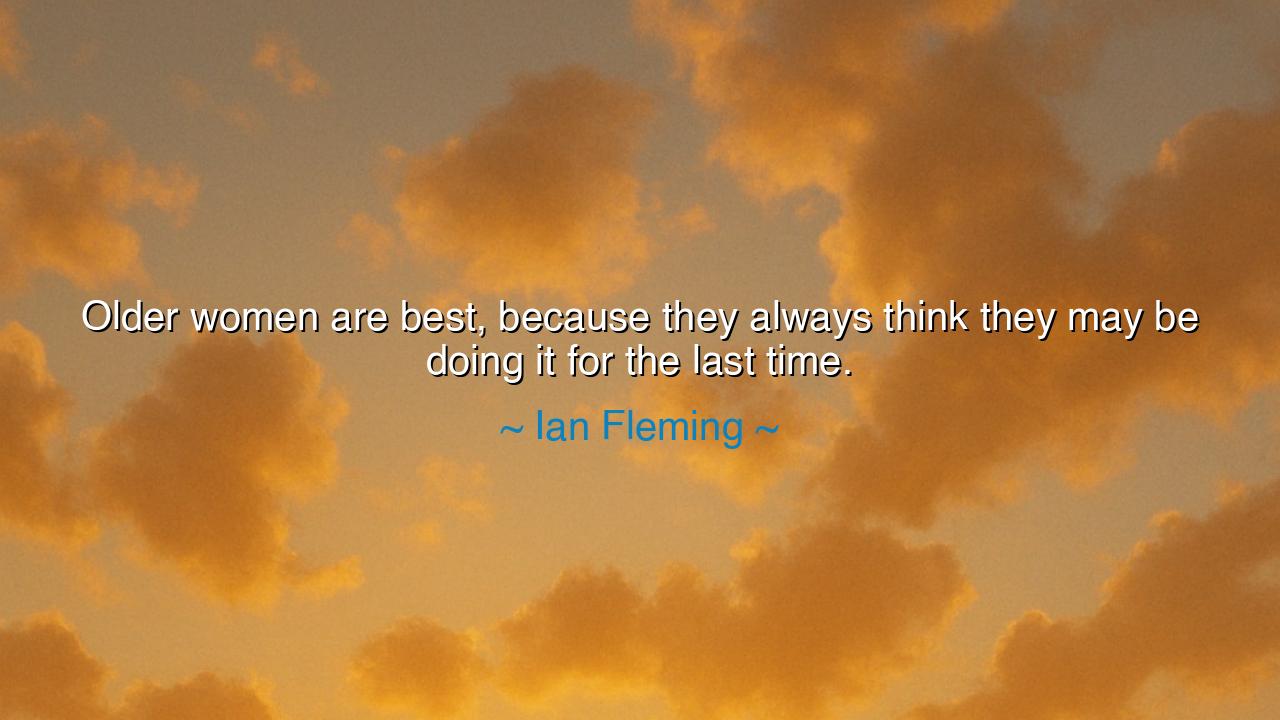
Older women are best, because they always think they may be
Older women are best, because they always think they may be doing it for the last time.






Ian Fleming, creator of James Bond and chronicler of desire, once remarked with provocative candor: “Older women are best, because they always think they may be doing it for the last time.” Though at first it seems a jest about passion, beneath it lies a profound meditation on mortality, intensity, and the fleeting nature of human experience. In Fleming’s eyes, older women carry with them the wisdom of impermanence; they love not casually but fiercely, knowing that each embrace may be the final one.
The origin of this thought springs from Fleming’s own world, a realm of espionage, danger, and fleeting pleasures. As a man who lived through the ravages of war and the intrigues of intelligence, he knew how fragile life could be. His words reveal that the awareness of time’s limit transforms ordinary acts into extraordinary ones. For those who believe the present moment may never return, every kiss, every glance, every touch is elevated to sacred fire.
History itself bears witness to this truth. In the aftermath of the Second World War, soldiers and their loved ones often lived with a heightened awareness that any meeting could be the last. Letters, dances, and hurried embraces carried an intensity that peace rarely knows. Women who had endured waiting, loss, and uncertainty approached love not with hesitation, but with urgency. In their passion was the wisdom Fleming described: that what may be the last time must be lived fully, without reserve.
This saying also speaks to the difference between youth and maturity. The young, believing they have endless tomorrows, often treat moments lightly, scattering them like seeds in the wind. But the older heart, schooled by loss and the passing years, knows that tomorrows are not infinite. It clings to the present with devotion, savoring what youth lets slip away. This is not merely sensual truth, but spiritual: mortality sharpens life’s sweetness.
Therefore, O seekers of wisdom, take Fleming’s words beyond their surface. They are not only about older women, but about all who understand the brevity of life. To live as if each act might be the last is to live with fullness, gratitude, and fire. For the true art of living is not in how long one has, but in how deeply one dares to taste each passing moment.






Mminh
This quote seems to imply that older women are more aware of the fleeting nature of experiences, which might make them approach things with more passion. But does this really differ from how younger women might engage with life? Could the desire to make moments count exist in all age groups, regardless of whether someone believes it might be their 'last time'? What does it say about how we perceive aging and the importance of each stage of life?
DKPham Dang Khoa
Ian Fleming’s quote touches on the concept of living life with a sense of finality, which could certainly lend itself to more intentional or passionate actions. However, is this view of older women a bit limiting? Do we risk reducing their experience to a one-dimensional perspective, where their value is tied to being 'last times' rather than an ongoing, rich phase of life? How do we create a fuller narrative of aging that doesn’t limit women’s value to just their 'final' moments?
HLNguyen Hai Lam
Fleming’s statement reflects a certain view of aging, where older women are thought to have an intense appreciation for the moment because they may feel it could be their last time doing something. Is this view empowering, or does it imply that older women are somehow more 'desperate' for experiences? How do we reconcile this with the idea that aging should be celebrated, and that every stage of life brings unique value?
QVNguyen Quang Vinh
This quote brings up an interesting point about the perspective that older women may have on life and experiences. Is it possible that the awareness of time makes them appreciate things more fully? But does this imply that younger women somehow lack this same depth or appreciation? Can it be that society unfairly romanticizes aging as if it holds a unique wisdom or urgency that younger people might not experience?
GPTran Gia Phu
Fleming’s quote seems to romanticize the idea of older women being more passionate or present in the moment. While there may be some truth in the idea that older individuals have a sense of urgency, is it fair to generalize all older women in this way? Do we really think that older women approach life differently than younger women, or is this a reflection of societal stereotypes about aging and sexuality?